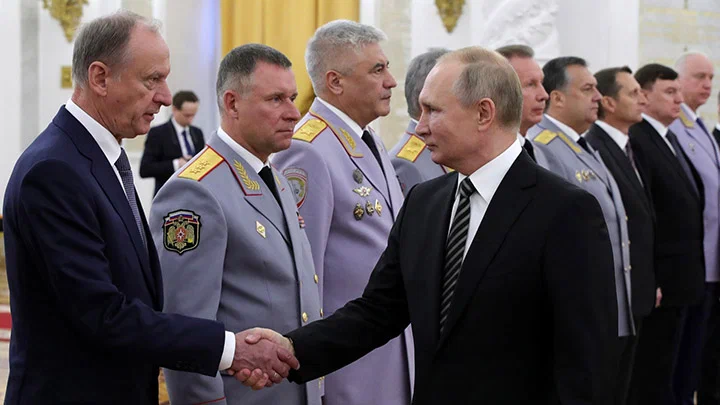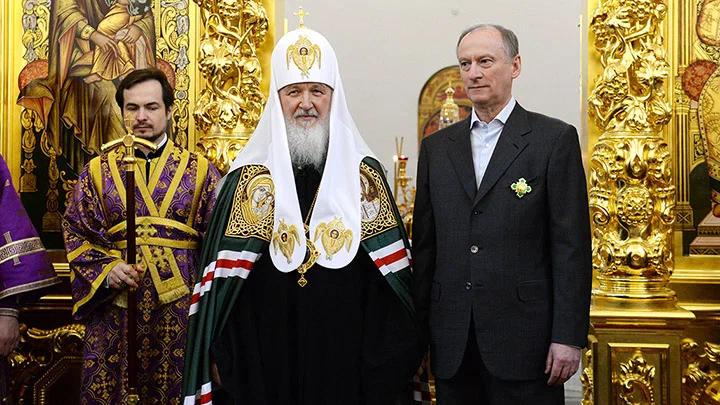
Spitting on the West’s Rules at the Top Level: What Putin Did Not Say, but Patrushev Did
NEW – July 8, 2022
It’s time to speak clearly, without halftones. And today, what the head of state cannot always say is said by the Security Council Secretary Nikolay Patrushev. But what is the role and place of this person in the system of power? Let’s get this straight.
“War is war.” Today, people want clarity and unambiguity, without halftones. Who is ours and who is not ours. What we are trying to achieve and what we have already achieved. What we didn’t achieve and who is to blame. How adequate are the actions of the authorities in this situation and to what extent they are ready to opt for a confrontation with the West, which was still called a “partner” yesterday, a confrontation that has already turned into a real war, much larger than our special military operation in Ukraine.
So, just today, another tough statement was made by Russian Security Council Secretary Nikolay Patrushev, saying that the goals of the special operation in Ukraine will be achieved, despite the West’s military assistance to Kiev. That is, we will fight to Victory: no retreats and compromises should be expected. This is exactly what many people have been waiting for and wanting to hear today.
Much depends on the ability of the top leadership to clearly articulate these issues in the spirit of Stalin’s “Brothers and Sisters!” If not all of them. As State Duma deputy Mikhail Delyagin rightly pointed out in one TV show:
“Let’s not forget that this is a “special operation” in Ukraine. And we have a war with the West, even if it is a hybrid one.”
It is clear that during any military operations, the team of the “siloviki bloc” comes to the fore, whose iconic figures today are the president himself, as well as Shoigu and Patrushev. Putin says a lot, although as president he can’t always say everything. Shoigu is clearly not up to speaking engagements right now. Thus, more often than others, the position is voiced today by the Secretary of the Russian Security Council, Nikolay Platonovich Patrushev, the statements of whom recently it makes sense to listen to more closely.
“HQ” in action. The word and deed of Nikolay Patrushev
Yes, today we see the head of state as he should be in a Great Russia – a resolute strong leader who does exactly what is currently more important for the country and the people. Ignoring all the diplomatic conventions, the “rules” set for the world (and, in fact, for itself) by the West.
However, until recently, we had the image of the president as a sort of “lone hero”, forced to fight in fundamentally different tasks, and often openly hostile environment. This is always fraught with the potential danger of changing course when a leader is changed or eliminated. So, today this is no longer the case at all – Putin clearly has a team of like-minded people (the conditional “HQ of the Supreme High Command”), for example, even Dmitry Medvedev, who suddenly began to burn the West with words. But the main positions of the new elite, apparently, are voiced by Nikolay Patrushev. And on a number of fundamentally important points, including the migrant issue, he did this even before the special military operation.
Like his colleague in the Security Council, who made a serious ideological evolution in his new place, becoming a real “hawk”, a burning speech for our former “Western partners”.
So, what is it, this position voiced by him on a number of fundamental issues? The conditional “HQ” has a clear understanding of “who is who” and who is specifically to blame for the destruction of the entire European security system. And it was Patrushev who voiced this position of Russia at the meeting on ensuring Russia’s national security in the Far East held in Khabarovsk on July 5:
“Russia, which defends its national interests and sovereignty, is declared an enemy by the United States and its allies, which is reflected in the doctrinal documents, including those adopted at the NATO summit in Madrid.”
And so it was. It was the United States and its allies that refused to engage in dialogue with Russia when Moscow offered strategic security talks, ignoring Russia’s demands and continuing to push NATO infrastructure to our country’s borders. The special operation in Ukraine and everything that followed were only direct consequences of this. At the same time, we have no illusions about the independence of Western countries in making decisions. As Nikolay Patrushev said at the historic Security Council meeting on February 21:
“Yes, we are negotiating with NATO, the European Union, and the OSCE… But negotiations must be conducted with the United States. Everyone else will do what the US says.”
It is also important that Russia is aware of the need to achieve not only political, but also economic sovereignty. Especially in the current environment. So, at a meeting on ensuring national security in the Far East, Patrushev appealed:
“Restrictions on foreign participation in the implementation of projects that are significant for the Russian energy sector should become important for protecting national interests and ensuring the country’s energy security.”
And already on June 30, Vladimir Putin signed a decree on the application of “special economic measures” in the fuel and energy sector: on the re-registration of the Sakhalin 2 parent company Sakhalin Energy Investment Company Ltd for a new operator in Russia. Indeed, it is difficult not to see a direct link between these two events, which indicate the existence of a very clear political line of the country’s leadership.

And finally, about the special operation and what will happen after it. Here the position is also voiced very accurately:
“We are not chasing deadlines. All the goals set by the President of Russia will be fulfilled… Nazism must either be eradicated 100%, or it will raise its head in a few years, and in an even uglier form.”
That is, no retreats in favour of “Western partners”, no “obscene peace” should be expected – Ukronazism will be finished off and eradicated, the necessary condition for which is a military victory achieved by consistent verified steps that allow to minimise losses. At the same time, the task of replacing a “bad” government with a “good” one is not set in Ukraine:
“I would like to remind you that our country has never controlled the fate of sovereign powers… the fate of Ukraine will be determined by the people living on its territory.”
That is, the position is clearly stated: there is a “territory of Ukraine” (note, not the country of Ukraine, not the state, but the territory), where the people living on it have every right to determine what this territory should be: part of Russia, a people’s republic or Europe.
New times call for a new elite
With all due respect to Leo Tolstoy’s literary talents, his denial of the role of personalities in history seems much less convincing than the Russian folk “judge the flock by its priest”. Much depends on the adequacy of the country’s leadership, especially when it is straining its forces in a military confrontation.
War, in addition to always bringing suffering and sacrifice, is also a kind of “moment of truth” that allows to “separate the wheat from the chaff”. Pay attention to how Siluanov and Nabiullina, who were always on the front pages, suddenly went into the shadows. How abruptly Golikova and her team of “total vaccinators” fell silent. And what a stench came out from a fair part of our art and media parties, and words can not convey. Because during the period of military trials, reality dominates chimeras and completely different people come to the fore, formulating new goals and setting ways to fulfil them.

The historian and publicist Roman Gozenko, who has devoted a lot of time to studying the elites of the Great Patriotic War, draws quite definite parallels with that time in his commentary to “First Russian” [Russia’s “Tsargrad” media outlet – SZ]:
“We, of course, understand that Patrushev expresses the policy of some influential near-presidential group with a patriotic orientation. Even today, the elite can see clear signs of healing from the liberal syndrome that almost destroyed the country. During the Great Patriotic War, our Victory was largely determined by the adequacy of the new demands of our ruling elite – those very “Stalinist” People’s Commissars and military leaders who combined unique intelligence, considerable freedom and responsibility associated with this. Even now, we must rely on responsible intellectuals – then we will win.”
The above statements by Patrushev give reason to believe that the process of “resetting” the elites is underway and at the end of the special operation we will see not only a completely new Russia and a new world, but also fundamentally different people in the elite. Historian and philosopher Andrey Fursov in an interview with “First Russian” expressed the opinion:
“The Russian leadership understands that even for the purpose of self-preservation, there can be no peace with the West in the near future – at least until the goals of the special operation are achieved. Until we show who is the boss in our geopolitical space. As for the long-term hard line, the British Royal Institute of International Relations ‘Chatham House’ said in its report that neither Russia nor the West’s position on Russia will change even after Putin’s departure. I think this is an indicator that our leadership still has a clear line, and the West is aware of it.”
So what?
The ancients did not say in vain that “a flock of sheep led by a lion will break a flock of lions led by a ram.” We in Russia are terribly tired of scolding the elites, who, I must say, gave us a lot of reasons for this. But today, against the background of the special operation, what we have been waiting for for a long time is happening: people come to the leadership and voice the official line, for whom we are at least not ashamed. War dictates its own demands, and those who do not meet them, like it or not, will have to leave.
That is exactly why “First Russian” strongly recommends listening to what Nikolay Patrushev says in his speeches. After all, he speaks not only (and perhaps not so much) from himself, but rather articulates the policy of the new elites, which is becoming more and more tangibly the state policy of Russia.
Vladimir Khomyakov




Geen opmerkingen:
Een reactie posten